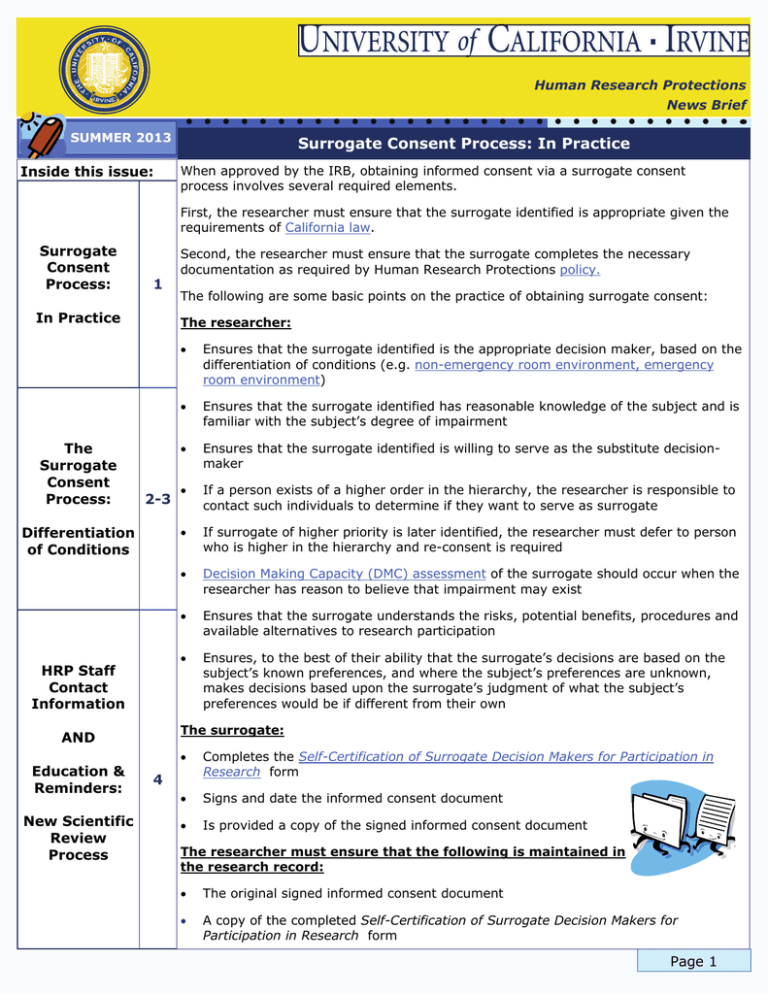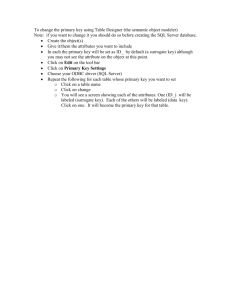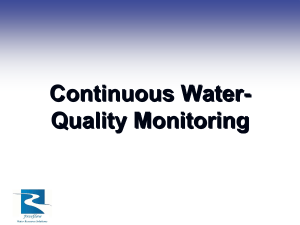Inside this issue:
advertisement

Human Research Protections News Brief SUMMER 2013 Inside this issue: Surrogate Consent Process: In Practice When approved by the IRB, obtaining informed consent via a surrogate consent process involves several required elements. First, the researcher must ensure that the surrogate identified is appropriate given the requirements of California law. Surrogate Consent Process: 1 In Practice The Surrogate Consent Process: 2-3 HRP Staff Contact Information Ensures that the surrogate identified is the appropriate decision maker, based on the differentiation of conditions (e.g. non-emergency room environment, emergency room environment) Ensures that the surrogate identified has reasonable knowledge of the subject and is familiar with the subject’s degree of impairment Ensures that the surrogate identified is willing to serve as the substitute decisionmaker If a person exists of a higher order in the hierarchy, the researcher is responsible to contact such individuals to determine if they want to serve as surrogate If surrogate of higher priority is later identified, the researcher must defer to person who is higher in the hierarchy and re-consent is required Decision Making Capacity (DMC) assessment of the surrogate should occur when the researcher has reason to believe that impairment may exist Ensures that the surrogate understands the risks, potential benefits, procedures and available alternatives to research participation Ensures, to the best of their ability that the surrogate’s decisions are based on the subject’s known preferences, and where the subject’s preferences are unknown, makes decisions based upon the surrogate’s judgment of what the subject’s preferences would be if different from their own The surrogate: AND New Scientific Review Process The following are some basic points on the practice of obtaining surrogate consent: The researcher: Differentiation of Conditions Education & Reminders: Second, the researcher must ensure that the surrogate completes the necessary documentation as required by Human Research Protections policy. Completes the Self-Certification of Surrogate Decision Makers for Participation in Research form Signs and date the informed consent document Is provided a copy of the signed informed consent document 4 The researcher must ensure that the following is maintained in the research record: The original signed informed consent document A copy of the completed Self-Certification of Surrogate Decision Makers for Participation in Research form Page 1 The Surrogate Consent Process: Differentiation of Conditions Page 2 California (CA) Health & Safety Code Section 24178 authorizes specific individuals to give surrogate informed consent for the enrollment of adult subjects who lack capacity to consent for medical experiments that “relate to the cognitive impairment, lack of capacity, or serious or life-threatening diseases and conditions of participants.” If a prospective subject cannot consent on his/her own behalf, federal regulations permit researchers to obtain consent from a legally-authorized representative. CA Health & Safety Code 24178 defines the categories of individuals who are legally authorized in California to provide surrogate consent for research. Depending on the setting, surrogate consent may be obtained from an individual in the order of the hierarchy as defined by the CA Health & Safety Code (non-emergency room environment) or from any individual in the hierarchy identified by the CA Health & Safety Code (emergency room environment). MEDICAL EXPERIMENT IN A NON EMERGENCY ROOM ENVIRONMENT - SURROGATE CONSENT: If person is unable to consent and does not express dissent or resistance to participation, surrogate informed consent may be obtained from a surrogate decision maker with reasonable knowledge of the subject, who shall include any of the following persons, in the following descending order of priority: 1. agents identified by an advance health directive 2. the conservator or legal guardian; 3. the spouse 4. the domestic partner 5. an adult son or daughter 6. a custodial parent 7. any adult sibling 8. any adult grandchild 9. the closest adult relative available Researchers must remember the following key points about the hierarchy: If two or more available surrogates in the same order of priority disagree, consent is considered not to have been given. If two or more available persons who are in different orders of priority disagree, the higher priority person shall not be superseded by the lower priority person. If the potential surrogate identifies a person of a higher degree of surrogacy, the investigator is responsible to contact such individuals to determine if they want to serve as surrogate. The Investigator must attempt to find the highest person in the hierarchy who agrees to be the surrogate. The subject should not determine their own surrogate. Consent can be revoked if a person higher in the hierarchy becomes involved later. Surrogate consent cannot be used for individuals on an inpatient or outpatient psychiatric hold. SUMMER 2013 The Surrogate Consent Process: Differentiation of Conditions Page 3 MEDICAL EXPERIMENT IN AN EMERGENCY ROOM ENVIRONMENT - SURROGATE CONSENT: If person is unable to consent and does not express dissent or resistance to participation, surrogate informed consent may be obtained from a surrogate decision maker with reasonable knowledge of the subject, who shall include any of the following persons: 1. agents identified by an advance health directive 2. the conservator or legal guardian; 3. the spouse 4. the domestic partner 5. an adult son or daughter 6. a custodial parent 7. any adult sibling Researchers must remember the following key points: If two or more available surrogates are available, refusal to consent by one person shall not be superseded by any other of those persons. Surrogate consent cannot be used for individuals on an inpatient or outpatient psychiatric hold. REQUESTING SURROGATE CONSENT: The use of surrogate consent must be specifically requested by the research team via the completion of Appendix E. If approved by the IRB, a researcher may use surrogate consent to consent research subjects. IRB approval of surrogate consent is stated on the IRB approval letter. As part of completing Appendix E, researchers must acknowledge that informed consent from the subject will always be obtained if possible. If decision making capacity (DMC) is questionable, the investigator should describe the research to the subject and perform a DMC assessment relevant to this study-specific information. A DMC tool is available on the HRP website for reference. If DMC is lacking the researcher should inform the subject of their intent to seek surrogate consent. If the subject displays resistance or dissent to participation or to the use of a surrogate, the subject must be excluded from participation. OBTAINING SURROGATE CONSENT- SUMMARY: The surrogate must complete the Self-Certification of Surrogate Decision Makers for Participation in Research form as an attachment to the informed consent document for the research study, and be given a copy of this form along with a copy of the consent to keep. In addition, the researcher must keep the signed form in the research records along with the signed original informed consent document. The Self-Certification of Surrogate Decision Makers for Participation in Research form verifies the willingness of the person to serve as a surrogate, details the relationship of the surrogate to the subject and the surrogate's qualifications demonstrating reasonable knowledge of the research subject. NOTE: Section 3 of the Self-Certification of Surrogate Decision Makers for Participation in Research form is required only for surrogate consent in non-emergency room environment settings. SUMMER 2013 HRP Staff Contact Information Education and Reminders: Institutional Review Board ’A’ IRB Team ‘D’ Biomedical Biomedical Matt Kinder, CIP Expedited and Exempt Submissions Administrator Jessica Sheldon, CIP 949-824-9819 Administrator mkinder@uci.edu 949-824-3831 jessica.sheldon@uci.edu Mihaela Nistor Senior Analyst Kaycie Craib, CIP 949-824-3711 Senior Analyst mnistor@uci.edu 949-824-5057 kcraib@uci.edu Joy Chu Analyst 949-824-6068 joy.chu@uci.edu ————————————————— Institutional Review Board ‘B’ Michael Baird Analyst 949-824-0665 bairdm@uci.edu ————————————————— Biomedical Karen Allen, MA, CIP Cheree DuBose, CIP Research Protections Director Administrator 949-824-1558 949-824-2576 karen.allen@uci.edu cheree.dubose@rgs.uci.edu Beverley Williams, CIP Anya Coultas Human Research Protections New Scientific Review Process 949-824-5746 949-824-5622 beverley.williams@uci.edu acoultas@uci.edu Debbie Melamud, MPH Theresa Sanchez, CIP Human Research Protections Analyst debbie.melamud@uci.edu UCI’s Institutional Review Board (IRB) will assume responsibility for the scientific review of research, in conjunction with the Biostatistics, Epidemiology, & Research Design (BERD) unit in the ICTS. Lead Researchers requiring scientific review must complete and submit the most recent version (April 2013) of the Protocol Narrative for Expedited and Full Committee Review (available for download on the Applications and Forms web page under the IRB Forms heading) as part of the IRB submission process. Why the Change? To reduce the number of review committees, and to help facilitate the IRB review of human subject research. When is Scientific Review Required?? Studies meeting the following criteria will require scientific review as part of the review for IRB approval: Administrator 949-824-2125 tmsanche@uci.edu —————————————————— Human Research Protections U.S. Mail: Office of Research Valerie Sanchez, MA, CCRP Administrator 949-824-4779 valerie.ms@uci.edu Melissa Camarena Senior Analyst 949-824-7114 mccamare@uci.edu Le’Quan Jackson Analyst 949-824-6662 ldjackso@uci.edu UCI investigator-authored Biomedical or clinical research Does not involve the indication of cancer* Involves greater than minimal Institutional Review Board ‘C’ Social - Behavioral What Has Changed?? As of May 1, 2013 the Institute for Clinical and Translational Science (ICTS) Scientific Review Committee (SRC) will no longer be responsible for the scientific review of research. Assistant Director Senior Analyst Page 4 University of California, Irvine 5171 California Ave., Suite 150 Irvine, CA 92697-7600 The Office is Open: Monday—Friday 8am—5pm General Email: IRB@research.uci.edu Web: http://www.research.uci.edu/ ora/hrpp/index.htm risk to subjects (i.e., full board review) Research described in the IRB protocol has not been previously peer reviewed or The IRB requires scientific review as part of its review (study-by-study basis) For research involving cancer, scientific review will continue to be performed by the Chao Family Comprehensive Clinical Trials Protocol Review and Monitoring Committee (CTPRMC). Questions? Please review the complete announcement and the frequently asked questions document or contact HRP Staff. SUMMER 2013



